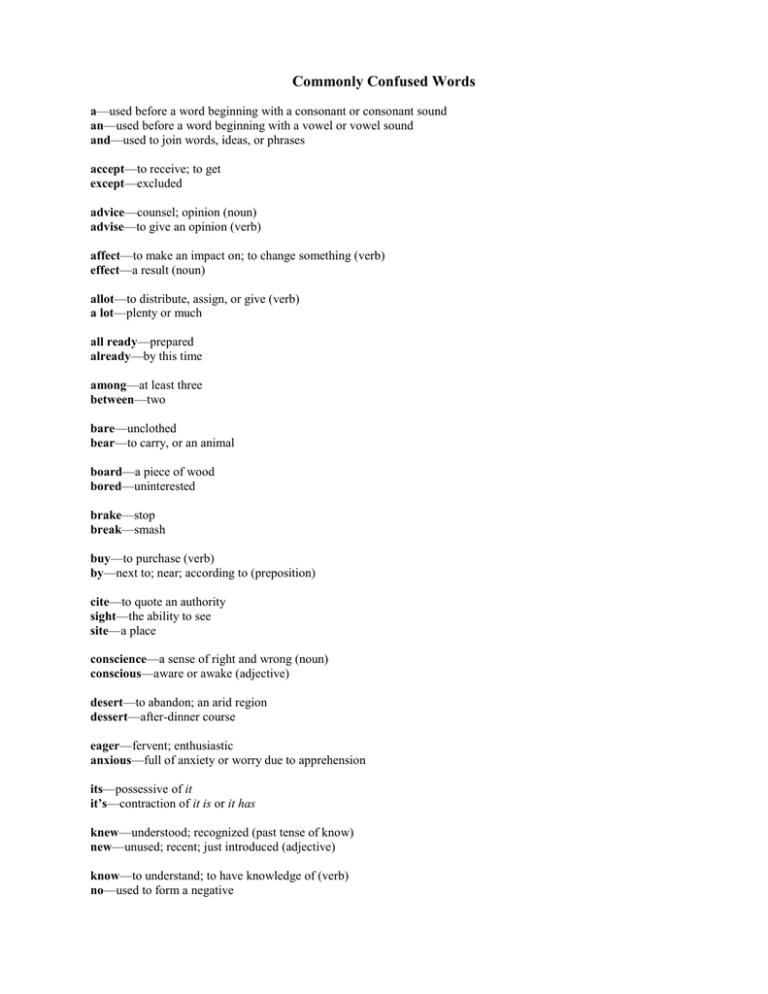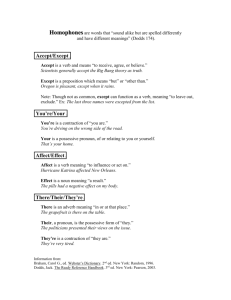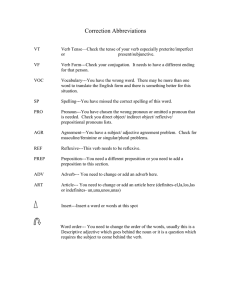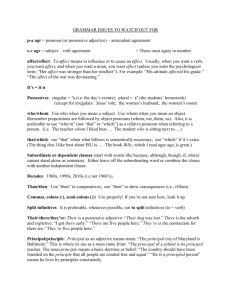Commonly Confused Words
advertisement

Commonly Confused Words a—used before a word beginning with a consonant or consonant sound an—used before a word beginning with a vowel or vowel sound and—used to join words, ideas, or phrases accept—to receive; to get except—excluded advice—counsel; opinion (noun) advise—to give an opinion (verb) affect—to make an impact on; to change something (verb) effect—a result (noun) allot—to distribute, assign, or give (verb) a lot—plenty or much all ready—prepared already—by this time among—at least three between—two bare—unclothed bear—to carry, or an animal board—a piece of wood bored—uninterested brake—stop break—smash buy—to purchase (verb) by—next to; near; according to (preposition) cite—to quote an authority sight—the ability to see site—a place conscience—a sense of right and wrong (noun) conscious—aware or awake (adjective) desert—to abandon; an arid region dessert—after-dinner course eager—fervent; enthusiastic anxious—full of anxiety or worry due to apprehension its—possessive of it it’s—contraction of it is or it has knew—understood; recognized (past tense of know) new—unused; recent; just introduced (adjective) know—to understand; to have knowledge of (verb) no—used to form a negative lay—to put or place something lie—to rest or recline less—used for quantities fewer—used for individual units, numbers loose—baggy; relaxed; not fixed in place (adjective) lose—to misplace; to forfeit possession of (verb) of—coming from; caused by; part of a group; made from (preposition) have—to possess (verb) should of, could of, would of—Texan inventions (of should be have) passed—past tense of pass past—after; time gone by peace—no disagreement; calm piece—a part of something larger quiet—soft in sound, not noisy (adjective) quite—completely, very (adverb) quit—to stop (verb) right—correct; in a direction opposite from left write—to put words on paper (verb) set—a collection of something (noun); to place an object somewhere (verb) sit—to rest with one’s rear end supported by a chair or other surface than—word used to compare two or more things or persons then—at a certain time; next in time their—possessive of they there—opposite of here they’re—a contraction of they are though—however; nevertheless; in spite of through—finished with (adjective); from one side to the other (preposition) threw—hurled; tossed (past tense of throw) to—toward too—also; excessively two—number following one use—to employ or utilize used—past tense of the verb use. Used to can indicate a past fact of state, or it can mean “familiar with.” weather—climate whether—if, or introducing a choice who’s—contraction of who is or who has whose—possessive of who your—possessive of you you’re—contraction of you are







